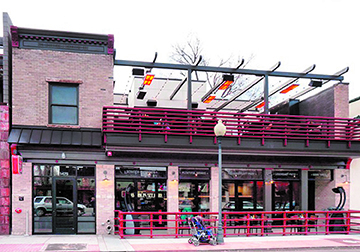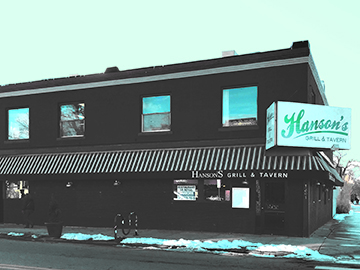by Robert Davis
Denver’s South Pearl Street saw three businesses exit the market between November and December 2019, becoming the latest victims to the city’s rising minimum wage and property taxes.

Hanson’s Grill & Tavern, a 21-year neighborhood staple, shut its doors in December. The Platt Park Tavern closed on New Year’s Eve after four years of business, and Palizo Italiano closed in November after just two years.
While it’s reasonable for neighborhood residents to be concerned about the health of their local shopping district, Mark Gill, Vice President of the Pearl Street Merchants Association says the closures remind him of a time in South Pearl’s recent past.
“Seven or eight years ago we had a similar situation where three restaurants all closed at once,” Gill told the Glendale Cherry Creek Chronicle in an interview. “People were worried then, but the neighborhood bounced back just fine, in my opinion.”
As a 21-year veteran of the neighborhood, including the last 14 years as a member of the Merchants Association and an owner of two buildings in the neighborhood, Gill says the neighborhood has seen a steady upward trend. However, that hasn’t kept him from seeing some of the issues businesses in the area face.
“The nature of the neighborhood hasn’t really changed much,” Gill said. “A majority of the businesses are mom-and-pop. But, there’s no denying that rents and property values are going up.”
The Chronicle reached out to Hanson’s, the Platt Park Tavern and Palizo Italiano for comment but didn’t receive a response.
Outdated Gallagher Problems
The state’s population boom and continued residential development that follows are causing problems for businesses all over Denver because of the criteria set forth in the Gallagher Amendment, a state constitutional amendment passed in 1982 that altered the way Colorado assessed and collected property taxes.

Before the amendment was passed, Colorado collected its property taxes through a complex set of formulas that most property tax professionals couldn’t fully comprehend. Afterward, Gallagher effectively decreased the assessment rates whenever statewide residential property values increased faster than business property values.
The problem? By maintaining this constant ratio between residential and business property tax assessments, Gallagher has essentially prevented Colorado from capitalizing on its expansive residential growth, leaving businesses to pick up the revenue shortfalls.
The Platt Park Tavern provides a perfect example of this problem. In 2019, the land and real estate tied to the business was assessed at value of over $4.5 million. The Tavern ended up paying a little more than $123,000 in property taxes, according to Denver County property tax records. In 2018, the business paid just under $97,000 in property taxes.
Meanwhile, a 32,000 sq. ft. mansion in Cherry Hills Village valued at $22 million paid just under $74,000 in property taxes for the same year. The mansion’s property tax assessment has dropped nearly 24 percent since 2016 as well.
For perspective, a residential property with a tax assessment comparable to the Tavern’s paid roughly $37,000 in property taxes, according to Zillow.
“Right now, we’re seeing far more residential development than we were two or three decades ago,” Gill said. “In the end businesses end up paying for a larger part of a shrinking pie.”
New Minimum Wage Problems
Outside of the property tax issue, small businesses in Denver have to contend with a minimum wage that is slated to reach nearly $16 per hour by 2022.
For restaurants, a business with notoriously tight profit margins, even the slightest increase in labor costs can be detrimental.
The Colorado Restaurant Association reports that over 200 new restaurants opened in Denver in 2019. On top of that, the explosive growth of Colorado’s population and its increased reliance on tourism to bring new faces to the Centennial State has sent restaurant sales skyrocketing to $13.9 billion annually.
But, between the lines, Denver’s restaurant scene is becoming more homogenized with chain and franchise restaurants taking up most of the retail space in Denver County. Local staples like the original Snarf’s Sandwiches has had to move through multiple locations as it battles against its labor costs and property tax assessments.
Even The Denver Post is not sold on the idea that increasing the minimum wage is right for Colorado. In an article from October 2019, the Post lamented the wage increase as “an exacerbation of the cost of living issues in Denver.”
Currently, a restaurant worker making the city’s $12 per hour minimum will need to work 103 hours per week to afford an average one-bedroom apartment costing $1,652 per month without paying more than 30 percent of their income on rent.
Meanwhile, restaurant owners are concerned that the new wage hikes won’t be enough to account for the industry labor shortage.
“Everything we’ve been hearing from our members, (they) have been saying, ‘How do we find more workers? We need more people to be working in our establishments,’” Carolyn Livingston, the spokeswoman for the Colorado Restaurant Association, told CBS 7.
About one-tenth of Colorado’s workforce works in the restaurant industry. However, the state’s record-low unemployment rate has elongated the replacement rate once an employee decides to leave.
Sign Of What’s To Come?
Still, there are signs that South Pearl Street will pull through. One aspect Gill always points to is that there are hardly any “For Sale” signs hung in the windows of Pearl Street businesses. In fact, most are sold by word of mouth these days, Gill says.
The neighborhood is also planning on adding arches at the Jewel, Iowa, and Louisiana entrances as the Merchants Association awaits the next rotation of businesses. Gill hopes the aesthetic additions will help spur growth in the area for years to come.
“South Pearl will rebound. These businesses closing at the same time was just a coincidence,” Gill said. “There will always be people coming and going, and people wanting to come in once the others have left.”
